- Home
- Bertolt Brecht
Bertolt Brecht: Mutter Courage und ihre Kinder 4
Bertolt Brecht: Mutter Courage und ihre Kinder 4 Read online
Bertolt Brecht
Collected Plays: Four
Round Heads and Pointed Heads,
Fear and Misery of the Third Reich,
Señora Carrar’s Rifles, Dansen,
How Much Is Your Iron?, The Trial of Lucullus
Volume Four of Brecht’s Collected Plays contains works from the 1930s, straddling fateful years in German political and cultural history – as well as in Brecht’s own life.
Round Heads and Pointed Heads started out as a radical adaptation of Shakespeare’s Measure for Measure. Brecht developed this into a powerful political allegory on Nazi race policy and conditions in the Germany which he had to leave in 1933. It was first staged in a small theatre in Denmark, to music by Hanns Eisler.
Fear and Misery of the Third Reich is unique in Brecht’s work. It consists of some thirty short scenes of life under the Nazis between 1933 and 1938 designed for use by groups in exile with little in the way of staging. The scenes are ‘realistic’, based on reports from inside Germany, but strung together on a long rhythmic poem to create a montage of anti-Nazi sketches.
Señora Carrar’s Rifles is a short play about the Spanish Civil War, based on J.M. Synge’s Riders to the Sea. First staged in Paris in 1938, it was widely performed in the months leading up to the Second World War. The other two short plays, Dansen and How Much Is Your Iron?, were minor works designed for amateurs in Scandinavia, where the Brechts lived till spring 1941.
The Trial of Lucullus is a radio play, in which the Roman general is tried by the Underworld for his military triumphs. It was first broadcast by Swiss radio in 1940, then performed in H.R. Hays’s translation at Berkeley in 1947 to music by Roger Sessions. This original version, however, had to give way to the changes made after Brecht’s return to East Germany and the controversial launching of a full-scale opera version with music by Paul Dessau.
Bertolt Brecht was born in Augsburg on 10 February 1898 and died in Berlin on 14 August 1956. He grew to maturity as a playwright in the frenetic years of the twenties and early thirties, with such plays as Man equals Man, The Threepenny Opera and The Mother. He left Germany when Hitler came to power in 1933, eventually reaching the United States in 1941, where he remained until 1947. It was during this period of exile that such masterpieces as Life of Galileo, Mother Courage and The Caucasian Chalk Circle were written. Shortly after his return to Europe in 1947 he founded the Berliner Ensemble, and from then until his death was mainly occupied in producing his own plays.
Other Bertolt Brecht publications by Bloomsbury Methuen Drama
Brecht Collected Plays: One
(Baal, Drums in the Night, In the Jungle of Cities, The Life of Edward II of
England, A Respectable Wedding, The Beggar or the Dead Dog,
Driving Out a Devil, Lux in Tenebris, The Catch)
Brecht Collected Plays: Two
(Man Equals Man, The Elephant Calf, The Threepenny Opera,
The Rise and Fall of the City of Mahagonny, The Seven Deadly Sins)
Brecht Collected Plays: Three
(Lindbergh’s Flight, The Baden-Baden Lesson on Consent, He Said
Yes/He Said No, The Decision, The Mother, The Exception and
the Rule, The Horations and the Curiatians, St Joan of the Stockyards)
Brecht Collected Plays: Four
(Round Heads and Pointed Heads, Fear and Misery of the Third Reich,
Señora Carrar’s Rifl es, Dansen, How Much Is Your Iron?,
The Trial of Lucullus)
Brecht Collected Plays: Five
(Life of Galileo, Mother Courage and Her Children)
Brecht Collected Plays: Six
(The Good Person of Szechwan, The Resistible Rise of Arturo Ui,
Mr Puntila and His Man Matti)
Brecht Collected Plays: Seven
(The Visions of Simone Machard, Schweyk in the Second World War,
The Caucasian Chalk Circle, The Duchess of Malfi )
Brecht Collected Plays: Eight
(The Days of the Commune, The Antigone of Sophocles,
Turandot or the Whitewashers’ Congress)
Berliner Ensemble Adaptations – publishing 2014
(The Tutor, Coriolanus, The Trial of Joan of Arc at Rouen 1431,
Don Juan, Trumpets and Drums)
Brecht on Art and Politics (edited by Tom Kuhn and Steve Giles)
Brecht on Film and Radio (edited by Marc Silberman)
Brecht on Performance: Messingkauf and Modelbooks – publishing 2014 (edited by
Tom Kuhn, Steve Giles and Marc Silberman)
Brecht on Theatre – publishing 2014 (edited by Marc Silberman, Steve Giles and Tom Kuhn)
Brecht in Practice – publishing 2014 (David Barnett)
The Craft of Theatre: Seminars and Discussions in Brechtian Theatre (Ekkehard Schall)
Brecht, Music and Culture – publishing 2014 (Hans Bunge, translated by Sabine Berendse and Paul Clements)
Brecht in Context (John Willett)
The Theatre of Bertolt Brecht (John Willett)
Brecht: A Choice of Evils (Martin Esslin)
Bertolt Brecht: A Literary Life – publishing 2014 (Stephen Parker)
A Guide to the Plays of Bertolt Brecht (Stephen Unwin)
Bertolt Brecht
Collected Plays: Four
Round Heads and Pointed Heads
translated by Tom Kuhn
Original work entitled:
Die Rundköpfe und die Spitzköpfe
Fear and Misery of the Third Reich
translated by John Willett
Original work entitled:
Furcht und Elend des Dritten Reiches
Señora Carrar’s Rifles
translated by Wolfgang Sauerländer
Original work entitled:
Die Gewehre der Frau Carrar
Dansen
translated by Rose and Martin Kastner
Original work entitled:
Dansen
How Much Is Your Iron?
translated by Rose and Martin Kastner
Original work entitled:
Was kostet das Eisen?
The Trial of Lucullus
translated by H.R. Hay
Original work entitled:
Das Verhör des Lukullus
Edited and introduced by Tom Kuhn
and John Willett
Contents
Introduction
Chronology
THE PLAYS
ROUND HEADS AND POINTED HEADS
FEAR AND MISERY OF THE THIRD REICH
SEÑORA CARRAR’S RIFLES
DANSEN
HOW MUCH IS YOUR IRON?
THE TRIAL OF LUCULLUS
NOTES AND VARIANTS
ROUND HEADS AND POINTED HEADS
Texts by Brecht
Measure for Measure (1931), Act One, scene 1
Cheated hopes
Notes for drawings
Props for The Round Heads
Round Heads and Pointed Heads
The Copenhagen production
Notes on Pointed Heads and Round Heads
Editorial Notes
FEAR AND MISERY OF THE THIRD REICH
Texts by Brecht
Fear and misery of the Third Reich
Note to Fear and Misery of the Third Reich
Further note
Notes to Fear and Misery of the Third Reich
Six additional scenes:
Ersatz feelings
The Internationale
The vote
The new dress
Any good against gas?
A possible last scene for Basel
Editorial No
tes
SEÑORA CARRAR’S RIFLES
Texts by Brecht
Note to Señora Carrar’s Rifles
Art or politics?
Different ways of acting
Dialogue about an actress of the epic theatre
Prologue to Señora Carrar’s Rifles
Epilogue to Señora Carrar’s Rifles
Another case of applied dialectics
Editorial Notes
Glossary/Historical Notes (for Fear and Misery and Señora Carrar)
DANSEN and HOW MUCH IS YOUR IRON?
Text by Brecht
Note [for How Much Is Your Iron?]
Editorial Notes
THE TRIAL OF LUCULLUS
Texts by Brecht
Lucullus’s Trophies
Discussion of The Condemnation of Lucullus
Editorial Notes
Notes to the opera The Condemnation of Lucullus
New passages included in the 1951 radio play
The Condemnation of Lucullus (opera)
Introduction
1932/33 TO 1939: ANTI-FASCIST EXILE
This volume contains Brecht’s important anti-Fascist plays from the 1930s, and indeed nearly all of his dramatic output from the years 1932 to 1939, the year of both The Trial of Lucullus (in the first version which we publish here) and Mother Courage and Her Children (in volume 5 of the series). These are the works that were conceived and written at the time of Brecht’s flight from Germany in February 1933, immediately after the Reichstag Fire, and during his and the family’s stay near Svendborg, a small town on the southern tip of the Danish island of Fyn. At the time of the conception and first version of Round Heads and Pointed Heads Brecht was still working in the seething atmosphere of artistic experiment and collaboration of Berlin in the late Weimar Republic, the political world and the artistic society which provided the context for the great Lehrstück experiments (of volume 3). For most of the thirties, however, Brecht and his colleagues were living and working in exile. The change in circumstances for a dramatic artist could scarcely be more stark. In Berlin he knew the theatres, the directors, the actors, and indeed the audiences. He could work closely with them, trying to evolve a new political avant-garde in the theatre. In exile he struggled to maintain links with other exiled artists, he travelled around, to Paris, to London, to Moscow, to New York, seeking out opportunities, making contacts, trying to stay up to date with political developments and aesthetic debates, and his diaries, letters and poems are full of worries about his isolation and the absence or inaccessibility of a public. The plays likewise document his concerns, and they signal a shift in his conception of a political literature: towards more immediate, accessible and practical contributions to the political struggles of a Europe threatened by the rising tide of Fascism.
Although they are more directly concerned with contemporary politics than most of Brecht’s other works, so that one might expect them to have dated more, several of these pieces retain an important place in the repertoire of the German theatre. Fear and Misery of the Third Reich especially is regularly performed, with various frameworks, new settings and combinations of scenes. The scene cycle has also inspired several imitations, in various languages, commenting in similar style on the miseries of the current political scene (most notably the East German Heiner Müller’s scenes from Germany, Die Schlacht, 1974, and two cycles by the Bavarian playwright Franz Xaver Kroetz: Furcht und Hoffnung der BRD, 1983, and Ich bin das Volk, 1993). There is clearly material here for the living theatre; as there is also in Round Heads and Pointed Heads – the racial politics of which is devastatingly familiar in modern Eastern Europe, Africa, Indonesia and elsewhere – and in the great anti-war piece The Trial of Lucullus.
It is worth remarking also that this was the period of Brecht’s first formulation of the notions of ‘Verfremdung’ (‘alienation’) and ‘Gestus’ in essays of 1935–38 on Chinese acting, on music, and on lyric poetry (see Brecht on Theatre, Methuen, 1964, pp. 91–120) and in the notes on the first production of Round Heads and Pointed Heads in 1936 (see also below, pp. 306–16). One might go so far as to say that it was only now, in exile, that Brecht fully formulated his theory of epic theatre. The ‘Street Scene: A Basic Model for an Epic Theatre’ also dates from 1938. And these are the years too in which Brecht wrote some of his most important essays on realism. The choice of forms for his political exile dramas was, it is clear, by no means merely an unreflected response to his reliance on amateur actors, ill-resourced theatres, and a public unversed in the experimental theatre of the Weimar Republic. On the contrary, it was perhaps the challenge of this change in circumstances, Fascism and exile, which provoked Brecht to some of his most important writings on aesthetics and the theatre.
* * *
In November 1931 the theatre and film director Ludwig Berger asked Brecht if he would like to collaborate to adapt Shakespeare’s Measure for Measure for a production with the Young Actors’ Group at the Berlin Volksbühne. The première was planned for January 1932. It is not surprising that Brecht accepted. Although his head must have been full of competing projects at the time this was attractive work. He had already adapted Macbeth (1927) and Hamlet (1930/31) for radio, and he had a lifelong fascination and enthusiasm for the Elizabethan theatre. Besides, as he put it rather later, at the time of the Danish première in 1936:
Many people think that Measure for Measure is the most philosophical of all Shakespeare’s works, and it is certainly his most progressive. It demands from those in positions of authority that they shouldn’t measure others by standards different from those by which they themselves would be judged. It demonstrates that they ought not to demand of their subjects a moral stance which they cannot adopt themselves. (see p. 304)
The original plan was simply to retell Shakespeare’s play in a more modern and somewhat ironised tone. Above all, the return of the Duke and his enlightened unravelling of the plot in the final scene were to be called into question.
It seems, however, that Brecht was soon distracted by the possibility of incorporating a strand of more contemporary political satire into the work, which consequently began to expand in all directions. The adaptation could no longer be completed as an efficient, and potentially money-making, commission, and Brecht went back to The Mother, which went into rehearsal in December 1931. He returned to the project in 1932, involving several of his closer co-workers, and the text went through a whole series of transformations, the most striking of which are described in the notes to the play in this volume. At this stage the director Heinz Hilpert hoped to secure a production at the Volksbühne, but the political climate was fast deteriorating and the plan was abandoned.
With the rise of Nazism Brecht had begun to exploit the work as a vehicle by which to respond to political developments in Germany. He now took a copy of the proofs of the first completed version into exile with him on 28 February 1933, and made concerted efforts to find a stage for the play. He sent it to the Soviet writer Sergei Tretiakov in Moscow, he talked to Ernst Josef Aufricht in Paris, and he and Elisabeth Hauptmann tried to interest theatres in Paris, London, New York and Prague. In 1934 the play was reworked and translated into Danish, with a view to a production directed by Per Knutzon in Copenhagen, but this collapsed amidst fears of censorship. Erwin Piscator contemplated a production in Moscow, or else in the Ukraine, on more than one occasion (letters to and from Brecht, September to December 1935, and again July 1936), but he ultimately left the Soviet Union in autumn 1936, never to return. There was a contract for a Russian film, which likewise came to nothing. Throughout 1934 Brecht continued to adapt the play, with input from a wide variety of collaborators and associates, including Hanns Eisler, who eventually produced some splendid music for the Round Heads and Pointed Heads songs. At this stage Brecht clearly thought of that play as a potential passport to the European theatre. And he had hopes of the Russian. He described it as ‘unlike The Mother, addressed to a “wide” public and taking account of purely
entertainment considerations’ (‘On the Use of Music in an Epic Theatre’, 1935, Brecht on Theatre, p. 89). He returned to the play again in 1936, and, after the première, continued to retouch it and added the notes. It was finally published in German in Herzfelde’s Malik-Verlag (now in London) in 1938. Earlier versions had already appeared by this time in Russian (provoking heated debates about realism and epic theatre with Communist critics such as Julius Hay) and in English.
Brecht had had next to nothing performed in the theatre (only The Mother in New York and isolated scenes and readings in clubs and the like) between 1933 and November 1936, when Round Heads and Pointed Heads was eventually premièred, under the Danish director Per Knutzon, in his small Riddersalen Theatre in Copenhagen. The set was by Svend Johansen, incorporating ideas by Mordecai Gorelik (see below p. 304ff), and the role of Nanna was taken by Lulu Ziegler, a popular actress and Knutzon’s wife. According to Margarete Steffin, Brecht thought it ‘one of his best productions’ (letter to Walter Benjamin, November 1936), but to Arnold Zweig the playwright was more cautious, describing it merely as ‘a very interesting experiment’ (letter of 18 February 1937). The play was not very well received, and it did not reach a wide public. It did, however, cause a storm of protest from local Fascists. It ran for twenty-one performances, and remained for some time the only one of Brecht’s plays to have achieved a full-scale production (setting aside the low-profile stagings of Señora Carrar and Fear and Misery, see below). In June 1940 he was still complaining in his journal: ‘it is impossible to finish a play without a stage. the proof of the pudding … apart from MOTHER and ROUND HEADS everything i have written since JOAN is untested.’
Brecht was seldom one to plan his plays right through to the end, and a great many of his works go through several important stages and versions. Nevertheless, the fragmentary and non-programmatic way in which a fluid political satire entered Round Heads and Pointed Heads over the years from 1932 to 1938 has left the reader, and the theatres, with a problem. It seems clear that the play was not originally concerned with Nazism at all, but it became Brecht’s first anti-Fascist play. Ultimately, however, the bones of Shakespeare could not provide a very satisfactory framework for a parable on Fascism, and the play was not as flexible a vehicle for the exile theatre as the scenes of Fear and Misery. That may be why, after 1938, despite the enormous amount of work that had gone into Round Heads and Pointed Heads, Brecht was never to return to it. Besides, the grotesque and fantastic approach to contemporary politics had not gone down well with the ordinary theatre-going public. As war approached and then engulfed Europe, and as Brecht moved on out of Denmark (April 1939), and eventually to the United States (July 1941), he may have despaired of ever refashioning the material to the even greater changes in circumstances, in politics and in the theatre.

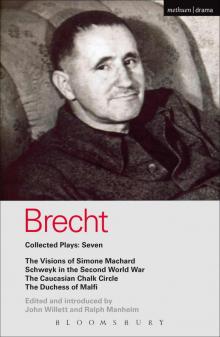 Bertolt Brecht: Mutter Courage und ihre Kinder 7
Bertolt Brecht: Mutter Courage und ihre Kinder 7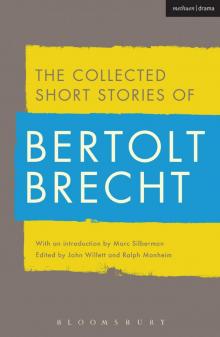 Bertolt Brecht
Bertolt Brecht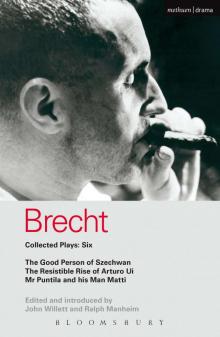 Bertolt Brecht: Mutter Courage und ihre Kinder 6
Bertolt Brecht: Mutter Courage und ihre Kinder 6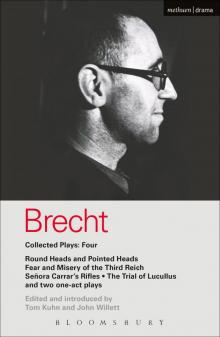 Bertolt Brecht: Mutter Courage und ihre Kinder 4
Bertolt Brecht: Mutter Courage und ihre Kinder 4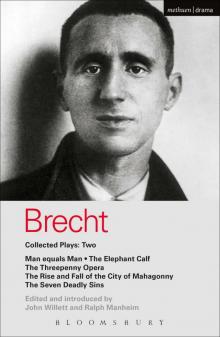 Bertolt Brecht: Mutter Courage und ihre Kinder 2
Bertolt Brecht: Mutter Courage und ihre Kinder 2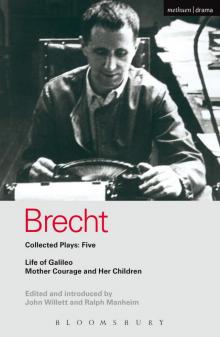 Bertolt Brecht: Mutter Courage und ihre Kinder 5
Bertolt Brecht: Mutter Courage und ihre Kinder 5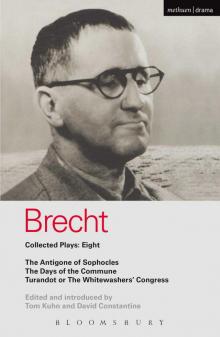 Collected Plays, Volume 4 (Bertolt Brecht: Plays, Poetry & Prose) 8
Collected Plays, Volume 4 (Bertolt Brecht: Plays, Poetry & Prose) 8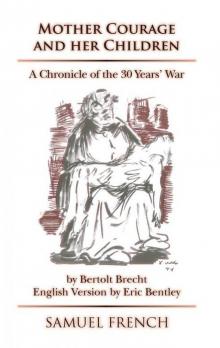 Mother Courage and Her Children
Mother Courage and Her Children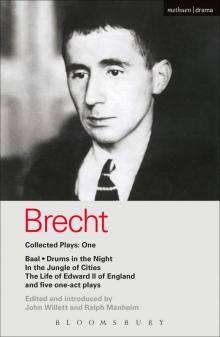 Bertolt Brecht: Mutter Courage und ihre Kinder 1
Bertolt Brecht: Mutter Courage und ihre Kinder 1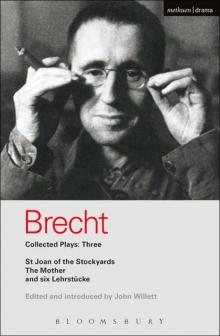 Brecht Collected Plays: 3: Lindbergh's Flight; The Baden-Baden Lesson on Consent; He Said Yes/He Said No; The Decision; The Mother; The Exception & the ... St Joan of the Stockyards (World Classics)
Brecht Collected Plays: 3: Lindbergh's Flight; The Baden-Baden Lesson on Consent; He Said Yes/He Said No; The Decision; The Mother; The Exception & the ... St Joan of the Stockyards (World Classics)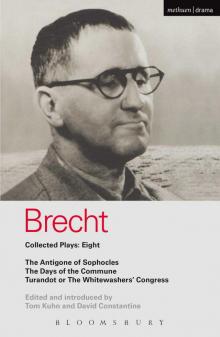 Brecht Plays 8: The Antigone of Sophocles; The Days of the Commune; Turandot or the Whitewasher's Congress: The Antigone of Sophocles , The Days of the Comm (World Classics)
Brecht Plays 8: The Antigone of Sophocles; The Days of the Commune; Turandot or the Whitewasher's Congress: The Antigone of Sophocles , The Days of the Comm (World Classics)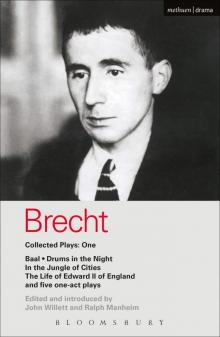 Brecht Collected Plays: 1: Baal; Drums in the Night; In the Jungle of Cities; Life of Edward II of England; & 5 One Act Plays: Baal , Drums in the Night , In the Jungle of Ci (World Classics)
Brecht Collected Plays: 1: Baal; Drums in the Night; In the Jungle of Cities; Life of Edward II of England; & 5 One Act Plays: Baal , Drums in the Night , In the Jungle of Ci (World Classics)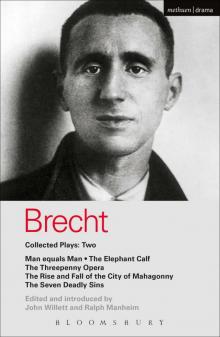 Brecht Collected Plays: 2: Man Equals Man; Elephant Calf; Threepenny Opera; Mahagonny; Seven Deadly Sins: Man Equals Man , Elephant Calf , Threepenny Ope (World Classics)
Brecht Collected Plays: 2: Man Equals Man; Elephant Calf; Threepenny Opera; Mahagonny; Seven Deadly Sins: Man Equals Man , Elephant Calf , Threepenny Ope (World Classics)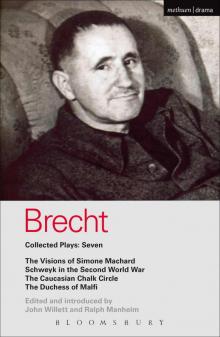 Brecht Collected Plays: 7: Visions of Simone Machard; Schweyk in the Second World War; Caucasian Chalk Circle; Duchess of Malfi (World Classics)
Brecht Collected Plays: 7: Visions of Simone Machard; Schweyk in the Second World War; Caucasian Chalk Circle; Duchess of Malfi (World Classics)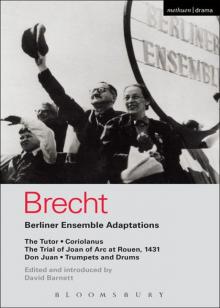 Berliner Ensemble Adaptations
Berliner Ensemble Adaptations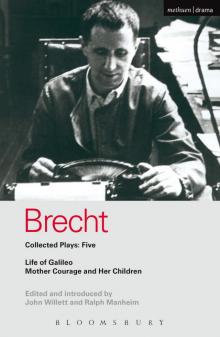 Brecht Collected Plays: 5: Life of Galileo; Mother Courage and Her Children (World Classics)
Brecht Collected Plays: 5: Life of Galileo; Mother Courage and Her Children (World Classics)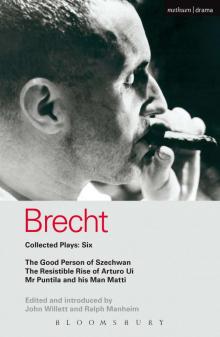 Brecht Collected Plays: 6: Good Person of Szechwan; The Resistible Rise of Arturo Ui; Mr Puntila and his Man Matti (World Classics)
Brecht Collected Plays: 6: Good Person of Szechwan; The Resistible Rise of Arturo Ui; Mr Puntila and his Man Matti (World Classics)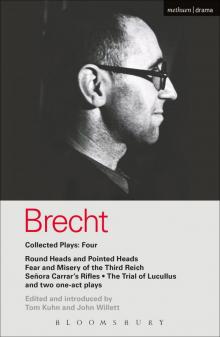 Brecht Collected Plays: 4: Round Heads & Pointed Heads; Fear & Misery of the Third Reich; Senora Carrar's Rifles; Trial of Lucullus; Dansen; How Much Is ... and Misery , Carr (World Classics)
Brecht Collected Plays: 4: Round Heads & Pointed Heads; Fear & Misery of the Third Reich; Senora Carrar's Rifles; Trial of Lucullus; Dansen; How Much Is ... and Misery , Carr (World Classics)